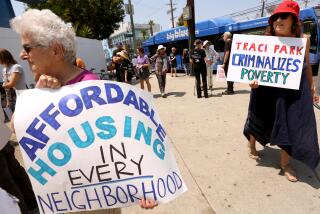Pregnant, Homeless, Alone in the Cities : Other Efforts to House Expectant Mothers Lag Behind New York
NEW YORK — New York’s effort to house homeless women who are also pregnant is the nation’s biggest, most expensive and most criticized. It is also far ahead of other cities’ attempts to care for these doubly distressed women.
“No city has come up with an adequate plan to deal with the problem. It’s a real tragedy,” said Tim Hager, assistant director of the National Coalition for the Homeless in Washington, D.C.
“At least New York is doing something. They’re just not doing the right thing. They’re wasting millions of dollars on fleabag hotels instead of building adequate housing,” Hager asserted.
New York is under court order to provide private rooms to pregnant women because of contagious illnesses rife in group shelters. None of four other cities surveyed by the Associated Press has a comparable policy.
New York has a pregnancy test to screen expectant mothers. The city, state and volunteers also provide specific prenatal care clinics for expectant mothers, a public program no other city offers, according to the homeless coalition.
Here is a brief look at the four other cities:
Los Angeles:
With an unknown number of pregnant women among its estimated 35,000 to 50,000 homeless, Los Angeles says care is provided through state health insurance and social programs at shelters.
“There’s no reason not to have quality prenatal care” in California, “unless you’re in the country illegally or mentally disturbed,” said Larry Johnson, assistant director of Los Angeles County’s Department of Community and Senior Citizens Services.
But social workers say care is hindered by the bureaucracy and an inadequate shelter system.
“As bad as things are in New York, there’s probably less available on the whole in California,” said Gary Blasi of the Legal Aid Society.
Ruth Schwartz, a nurse with the Los Angeles Health Care Project, says health centers are overloaded and public transportation is inadequate.
“If you’re pregnant, you’re at the bottom of the homeless pile. The system is in no way meeting the demand. Only the persistent and the determined keep their appointments for prenatal care,” Schwartz said.
She said she visits families who live among church pews, in cars, in garages divided by bed sheets or shacks made of plywood and tarps. The women in the shacks drink and bathe from a garden hose.
Chicago:
In Chicago, a routine medical screening given to homeless people entering the shelter system identifies women who are pregnant and sends them to one of three shelters among the city’s 45. The women are encouraged to see their own doctors for prenatal care.
“Our focus is not on pregnancy. Our focus is finding them a place to stay,” said Judith Walker, commissioner of the Department of Human Services. “Prenatal care is the least of their worries. You’ve got to deal with survival first.”
The city has no count on how many of its estimated 25,000 to 30,000 homeless are pregnant.
Atlanta:
Pregnant women get priority in Atlanta’s effort to place all homeless in permanent, subsidized housing when it becomes available, so their numbers among the 10,000 to 20,000 homeless are no more than a few dozen, according to the Task Force for the Homeless. Women must provide proof of pregnancy from their own doctors.
Prenatal care is available at one hospital, and the homeless are given transportation tokens to get there. However, it is time-consuming.
“It takes a whole day of their time to get care. You spend your whole day waiting,” said Anita Beaty, director of the Task Force.
Boston:
The bulk of the 15,000 to 20,000 homeless people in Massachusetts live in Boston and 75% are families, but officials don’t know how many are pregnant women. State welfare provides health care, but there are no specific prenatal clinics.
State social workers try to contact pregnant homeless women about public hospitals and clinics where prenatal care is available, but they concede that they don’t reach everyone.
More to Read
Sign up for Essential California
The most important California stories and recommendations in your inbox every morning.
You may occasionally receive promotional content from the Los Angeles Times.










